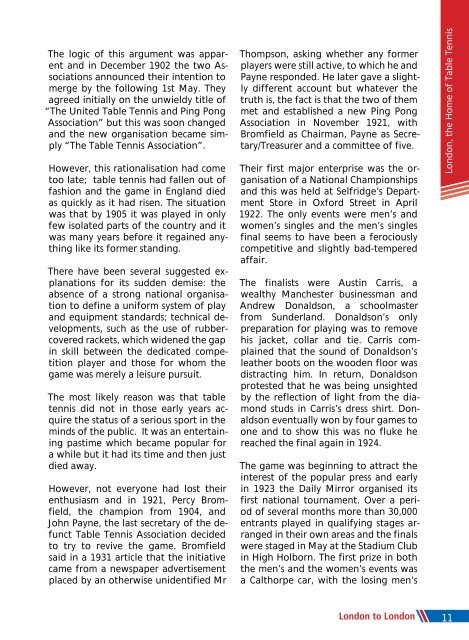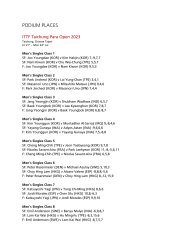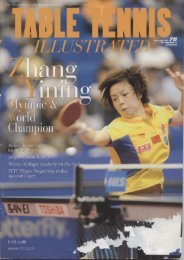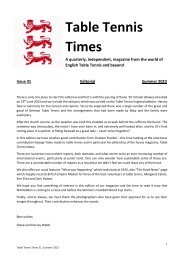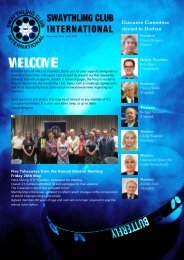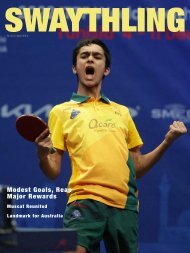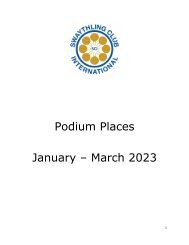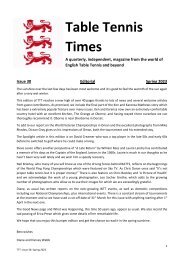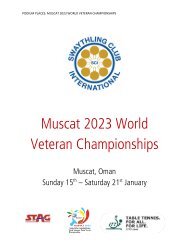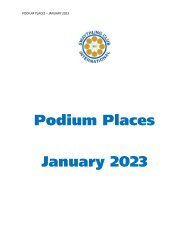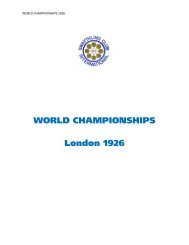Create successful ePaper yourself
Turn your PDF publications into a flip-book with our unique Google optimized e-Paper software.
The logic of this argument was apparent<br />
and in December 1902 the two Associations<br />
announced their intention <strong>to</strong><br />
merge by the following 1st May. They<br />
agreed initially on the unwieldy title of<br />
“The United Table Tennis and Ping Pong<br />
Association” but this was soon changed<br />
and the new organisation became simply<br />
“The Table Tennis Association”.<br />
However, this rationalisation had come<br />
<strong>to</strong>o late; table tennis had fallen out of<br />
fashion and the game in England died<br />
as quickly as it had risen. The situation<br />
was that by 1905 it was played in only<br />
few isolated parts of the country and it<br />
was many years before it regained anything<br />
like its former standing.<br />
There have been several suggested explanations<br />
for its sudden demise: the<br />
absence of a strong national organisation<br />
<strong>to</strong> define a uniform system of play<br />
and equipment standards; technical developments,<br />
such as the use of rubbercovered<br />
rackets, which widened the gap<br />
in skill between the dedicated competition<br />
player and those for whom the<br />
game was merely a leisure pursuit.<br />
The most likely reason was that table<br />
tennis did not in those early years acquire<br />
the status of a serious sport in the<br />
minds of the public. It was an entertaining<br />
pastime which became popular for<br />
a while but it had its time and then just<br />
died away.<br />
However, not everyone had lost their<br />
enthusiasm and in 1921, Percy Bromfield,<br />
the champion from 1904, and<br />
John Payne, the last secretary of the defunct<br />
Table Tennis Association decided<br />
<strong>to</strong> try <strong>to</strong> revive the game. Bromfield<br />
said in a 1931 article that the initiative<br />
came from a newspaper advertisement<br />
placed by an otherwise unidentified Mr<br />
Thompson, asking whether any former<br />
players were still active, <strong>to</strong> which he and<br />
Payne responded. He later gave a slightly<br />
different account but whatever the<br />
truth is, the fact is that the two of them<br />
met and established a new Ping Pong<br />
Association in November 1921, with<br />
Bromfield as Chairman, Payne as Secretary/Treasurer<br />
and a committee of five.<br />
Their first major enterprise was the organisation<br />
of a National Championships<br />
and this was held at Selfridge’s Department<br />
S<strong>to</strong>re in Oxford Street in April<br />
1922. The only events were men’s and<br />
women’s singles and the men’s singles<br />
final seems <strong>to</strong> have been a ferociously<br />
competitive and slightly bad-tempered<br />
affair.<br />
The finalists were Austin Carris, a<br />
wealthy Manchester businessman and<br />
Andrew Donaldson, a schoolmaster<br />
from Sunderland. Donaldson’s only<br />
preparation for playing was <strong>to</strong> remove<br />
his jacket, collar and tie. Carris complained<br />
that the sound of Donaldson’s<br />
leather boots on the wooden floor was<br />
distracting him. In return, Donaldson<br />
protested that he was being unsighted<br />
by the reflection of light from the diamond<br />
studs in Carris’s dress shirt. Donaldson<br />
eventually won by four games <strong>to</strong><br />
one and <strong>to</strong> show this was no fluke he<br />
reached the final again in 1924.<br />
The game was beginning <strong>to</strong> attract the<br />
interest of the popular press and early<br />
in 1923 the Daily Mirror organised its<br />
first national <strong>to</strong>urnament. Over a period<br />
of several months more than 30,000<br />
entrants played in qualifying stages arranged<br />
in their own areas and the finals<br />
were staged in May at the Stadium Club<br />
in High Holborn. The first prize in both<br />
the men’s and the women’s events was<br />
a Calthorpe car, with the losing men’s<br />
<strong>London</strong>, the Home of Table Tennis<br />
<strong>London</strong> <strong>to</strong> <strong>London</strong> 11


